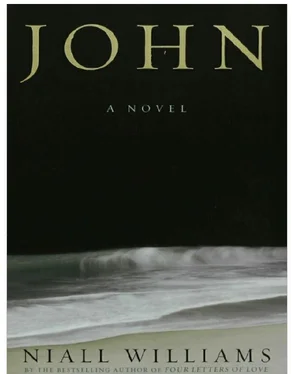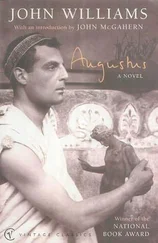Danil, a disciple of sixty, brings the news. It is late afternoon. Light is thinning.
'He speaks in delirium. We must pray for him.'
John stirs from reverie, angles to Danil his head, then rises quickly. 'I will go to him.'
'No!' Papias does not mean to startle but he does. 'I will go, Master, let me.' He wears a pink desert flower of guilt and concealment on his cheeks.
Danil looks at him, astonished that he would tell the Apostle what to do.
'It may be catching,' Papias says to him and twists the hand that touched Prochorus's face to wake him. 'Let me go only.'
John does not pause. 'Lead me,' he says.
They go down the rock face to the stones of the foreshore. Seabirds whirl above them. A bright wind hammers silver out of the sea. The Apostle's robe is blown against him, so he seems thinned to nothing, a pale sliver of light traversing the stones. They come along by the hardened sand, the smaller gulls dancing before them, printing the virgin ground.
'Here, Master,' Papias says, and they turn where the shore bends away and stones have been lifted to make a pathway upwards, towards two huts, part tent, part boat, perched on the edge. The old apostle is surprisingly nimble, his feet sure, his head high, and he moves with silent purpose and fixed demeanour, unencumbered, it seems, by blindness.
When they arrive on the cliff top, three of the other disciples, Simon, Lemuel, and Meletios, are knelt outside praying. They stop when the others approach, rise and go towards them.
'He is worse with every moment, Master,' Simon says. 'Ioseph is with him.'
John stoops in the doorway. The inner darkness is no darker to him. He does not see the ravage of black blister that spreads on the scribe's face and neck, the yellowish complexion of his forehead. By his side, Papias sees these and must draw his hand sharply to his mouth to obstruct the vomit, then spin gagging out into the daylight.
Ioseph rises from his place by the bed mat and touches the Apostle's hand. 'He will not take water, Master,' he says. 'He speaks wildly, cries out, then is silent but for convulsions that seize him. He is shaken as if by a force, then released like a creature thrown aside. His blister climbs and bubbles. He is fevered hot as fire. In instants he returns to himself, speaks for you to come, then is lost again.'
John approaches. He feels downward with his right hand, is guided by Ioseph, and so finds the rough timber stool. His head is upward, his eyes far away, as though watching in the infinite dark for the descent of most slender light.
The other disciples gather behind, silent, watchful, expectant of miracle and afraid it will not come. They have testament of many healings, have preached the same countless times — leprosy, lameness, wild contagions of the blood — death itself they have preached undone by faith. But never have they witnessed it. Their stories are their creed, and by these they have stood in marketplace and hilltop telling to the crowd until so many imagined damaged figures were made whole that the world entire could seem cured by this Saviour. The disciples recounted it with greater or lesser detail each to their own fashion. But in each of them, in the disparate corners of lands where they were, the telling was informed not by evidence. They had seen no curing themselves, only told of those told to them. Now they hold their breaths in the hut — to keep from the fever, and lest they obstruct by human weakness the coming of the power.
It is so. John bends down his head to Prochorus and whispers his name. The scribe does not move. He lies with shallow breath on the ledge of death. John lifts his right hand, thin fingers moving toward the other's brow.
'Do not touch him, Master!' It is Papias, flushed and wide-eyed in the doorway. 'Do not touch him, Master.'
Simon cannot help himself from moving slightly back, but not John. There is a fragment of delay, no more; John's hand reaches and finds the face of Prochorus. His fingers feel the broken skin, the fury of heat, the clam and ooze, a quality waxen and lifeless in the flesh. He lays his palm against the flamed cheek, bows his head, prays.
By the entranceway the others kneel. Discovering a shallow in their faith, they breathe through cupped fingers. The time is like a dark metal beaten thin. It stretches outwards to where it must give beneath the blows. For nothing happens. Swiftly the afternoon is taken by evening into the sea. A lamp is lit. And still the Apostle is bent down over the scribe, his hand upon the face. He prays in silence, moves slightly back and forth on the stool so its joints sing thinly.
And still nothing happens. How often is it to be so? To the ten thousand prayers they pray these years on the island what answers come? No miracles have attended them. No signs that they are cherished, or that the long suffering of their faith is considered, that their sacrifice is measured and in the hereafter will be rewarded.
There is nothing. There is darkness and wind off the stars. There is the same sea sighing in chains of waves. What invisible drama plays, what passes to and fro in the columns of air above them, none knows, but the disciples think: perhaps the time is arrived at last. Perhaps the bald scribe who had attended the Apostle in his revelation is himself to reveal the Lord.
The time is beaten away, and is as nothing. No hours are measured.
The knees of those kneeling ache, the damp of the ground travels through them. Night saddles their shoulders with cold. On the bed mat Prochorus tosses and wrestles the unseen. John says his name, but it does not still the scribe. He kicks at a beast that stalks toward him.
This, your servant, Lord.
If it be your will.
Before the dawn the wind turns about and comes from the sea into the dwelling. It makes flap the canvas sides; bestirs papyrus, dried seaweed, fistful of seeds; rolls the wooden beak-cup from table to floor. The disciples are statues in half sleep, half prayer, otherliness. The wind touches them on their stooped shoulders, passes to the Apostle, who turns towards it, inquisitive of what fills the dark room where the scribe is dying. His hand is laid on Prochorus's forehead. The fever is there still. The prayers, the herbs brought and crushed, tinctures dribbled on his lips, poultices applied, all have wrought little change. Only that the patient is grown calm. Several times in the night he woke and whispered with cracked voice what could not be understood. Now the wind whirls into the hut. The lamp is out. All are in blue-black shade and do not know at first that then Prochorus opens his eyes.
John feels it.
'Prochorus,' he says, and leans down. He puts his head close to the other's lips.
What the scribe says is not heard by the others. The Apostle listens at the swollen, blistered mouth. To Prochorus he says then, 'I tell you, Jesus is the Christ, truly he is the Son of God.' And leans slightly back as though he is newly aware of a task ahead of him and the enormity of it, as though he sees suddenly the frailty of faith, of Christianity itself. John sits upright. He raises his voice in the wind.
' "The wind blows about at will," Jesus said to Nicodemus, in Jerusalem. "You hear the sound it makes but do not know where it comes from or where it goes. So it is with everyone begotten of the spirit. If you do not believe about earthly things, how are you going to believe when I tell you about heavenly things? No one has gone up into heaven except the one who came down from heaven — the Son of Man. And just as Moses lifted up the serpent in the desert, so must the Son of Man be lifted up," the Lord said, "that everyone who believes in him may have eternal life in him." Yes, the Lord said, "God loved the world so much he gave his only Son that everyone who believes in him may not perish but may have eternal life." '
Читать дальше










